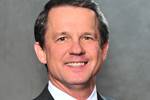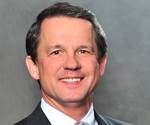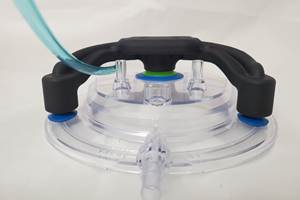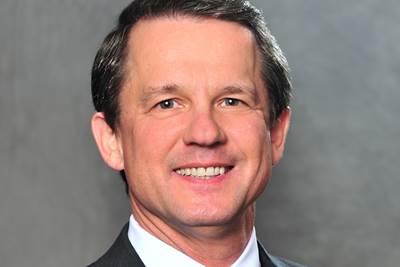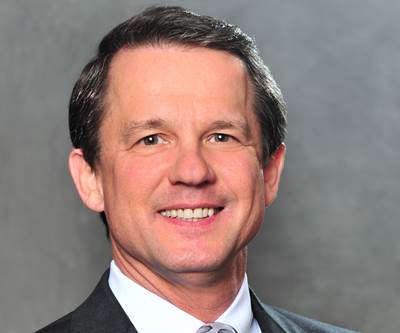Radoszewski Takes PLASTICS Reins at Pivotal Moment
When a new leader assumes control over an organization, it is typical to ask, “What’s your vision for Association X, Y, Z..?”. Tony Radoszewski, new president and CEO of the Plastics Industry Association (PLASTICS), thinks the premise behind that question is all wrong.
“It’s not important as to what my vision is; what is important, is the vision of the membership,” Radoszewski says. When Plastics Technology spoke with Radoszewski (pronounced Rad-uh-chef-ski) in early October, he had nearly completed his second full week on the job. Even in these early days, however, he had a very specific notion of how associations can thrive, with the initiative flowing up from the rank and file instead of down from his new office in Washington D.C.
“The best-run organizations have an engaged membership,” Radoszewski says. “You take the collective wisdom of all these diverse organizations—these companies and the people who are in these companies—and you focus in specific directions on different subjects. I think that’s really where associations work best, when they leverage that knowledge of the membership and bring this community together.”
Radoszewski came to PLASTICS after 13 years at the Plastics Pipe Institute, taking the reins of an organization headed for nearly 15 years by his extremely well-regarded and Hall-of-Fame predecessor, Bill Carteaux. It was Carteaux’s passing in December 2018, that created the opening Radoszewski has now filled—a post he initially didn’t see himself pursuing. Calling Carteaux a “larger-than-life” person, Radoszewski recalls some advice he gave to a PLASTICS board member at Carteaux’s memorial service.
“I said, ‘Good luck finding a replacement for [Carteaux]—those are big shoes—take your time,’” Radoszewski recalls. Radoszewski would know. At the time, he headed another association, the Plastics Pipe Institute (PPI), but his relationship with Carteaux went back decades with the two men entering the plastics industry at roughly the same time. A mutual connection suggested they have dinner, and when they did, a bond instantly formed. “We became fast friends,” Radoszewski says, “and we were friends ever since.”
A couple weeks following the memorial, it was Radoszewski’s wife who first suggested he go after the PLASTICS opening. He initially balked, noting that he considered his job at the time, as PPI chairman, the best he’d ever had. His wife was convinced, however, that the same energy he’d brought to PPI, growing its membership from 109 to 178 over 13 years, while creating a strong brand recognized across the North American market it served, could be just what PLASTICS needed. Conflicted, Radoszewski sought a higher perspective via prayer. “I said, ‘You’ve got to give me some signs,’ and boy, be careful what you ask for because they came fast and furious. I mean, people out of the blue were telling me I need to go after this job.”
Among those people was the former mutual acquaintance who long ago had suggested a dinner with Carteaux that formed the basis of a long friendship. “Not two days after my wife said this, I got a text message from my former chairman who had introduced me to [Carteaux] saying, ‘Are you in?’” Radoszewski says. He was, and after a series of interviews and meetings with the search committee, he stepped into a new role. “I was fortunate enough to get the job, and I’m still humbled to this day,” Radoszewski says.
Consumer-Facing Industry
While there are obvious similarities between the associations, Radoszewski is well aware of the key differences between PLASTICS and PPI and what they’ll mean for him strategically. “If you look at PPI and PLASTICS, they both have three major groups: resin producers, machinery manufacturers and then the processors,” Radoszewski says. “In PLASTICS, we have one more, and that’s the brand owners.”
It’s that last group, and the fact that what PLASTICS members produce is consumer facing, which is a key difference. “With pipe, it’s buried in the ground,” Radoszewski says, “nobody sees it. For members that make up PLASTICS, it is almost all consumer-related products in one way or another. We really touch the entire population one way or another, and I think for the most part, on a very positive note.”
It’s also an association and an industry under attack from the outside, and weakened from within, with big name brand owner members like Coca-Cola, PepsiCo, and most recently, SC Johnson, leaving its ranks under activist pressure. Radoszewski sees value in reaching out to exiting brand owners and anti-plastics non-governmental groups, alike.
“The first thought that comes into my mind is, my heart goes out to these guys,” Radoszewski says of now ex-PLASTICS members like SC Johnson, “because what they did in their businesses is found the best materials to package their products that make them affordable, convenient and safe for consumers.” Radoszewski notes that the current ubiquity of plastics speaks to how well the material solves a wide range of problems. “In a free market, the best solution will rise to the top, and plastics did,” Radoszewski says. “I’m always amazed when people say, ‘Boy, there’s a lot of plastics.’ I say, ‘Yeah, there’s a lot of plastics because it’s the best product to use.’”
Plastics Proud
Radoszewski wants that basic utility and value of the material to be top of mind for PLASTICS members and the industry at large as it faces intense criticism from the public. “At the onset, the message we have to take to our members and to their employees is that our industry brings great value to everyone’s life,” Radoszewski says. “We do things that make peoples’ lives better, easier, healthier.”
The industry recently wrapped up one of its biggest events—the triennial K fair in Düsseldorf, Germany—and Radoszewski, who was at the fair for the duration, says the innovation on display should help invigorate the industry. “Sometimes you just get so beaten down you forget you’re doing really good things,” Radoszewski says. “So the more we can get the message out about the benefits of plastics, the better. The smart people that created these polymers did it for the betterment of people, and I think that’s the first message that we have.”
The Power of Associations
Radoszewski sees leading PLASTICS as the culmination of career in the industry that began in 1980 in resin manufacture at Phillips Chemical, after earning a degree in chemisty, with work on the processing side at Advanced Drainage Systems along with association work at PPI. Born and raised in Milwaukee, Radoszewski’s first time away from Wisconsin came at the age of 18 when he accepted a full-ride academic scholarship to St. Mary’s University in San Antonio, Tex. In a career with stints in sales, marketing, management and consulting, it was ultimately association work that piqued his interest the most.
“Coming out of industry, I had no idea what association work was,” Radoszewski says. “As part of Phillips and Advanced Drainage Systems, we were engaged with associations, but I never thought it would be a career path. Once I got into it, I was very excited about it because what you’re able to do is to take the collective wisdom of so many organizations and companies that allows you to get a better grasp on the challenges that face an industry rather then just a specific company.”
At this time, perhaps more than any other, the collective knowledge and skills of the plastics industry, will be called upon.
Related Content
BASF Highlighting How They 'Make, Use and Recycle Future Solutions'
NPE2024: BASF is using its proprietary computer-aided engineering tool Ultrasim when designing for sustainability in a broad range of industries.
Read MoreBeyond Prototypes: 8 Ways the Plastics Industry Is Using 3D Printing
Plastics processors are finding applications for 3D printing around the plant and across the supply chain. Here are 8 examples to look for at NPE2024.
Read MoreAttending NPE2024 From the Perspective of a Molder
NPE2024 has come and gone, but before it’s completely in our collective rearview, Plastics Technology asked Rodney Davenport, vice president at injection molder CH3 Solutions, for a processor’s perspective on the big show.
Read MoreFor Extrusion and Injection-Blow Molders, Numerous Upgrades in Machines and Services
Uniloy is revising its machinery lines across the board and strengthening after-sales services in tooling maintenance, spare parts and tech service.
Read MoreRead Next
PLASTICS Has a New President & CEO—Tony Radoszewski
Industry veteran Radoszewski comes to PLASTICS from the Plastics Pipe Institute (PPI). Has also worked for resin and processing concerns.
Read MorePlastics Pipe Institute Talks Recycled Plastics Use
Tony Radoszewski, Plastics Pipe Institute president, discusses recycled content in pipe and converting packages with a 60-day shelf life into products with a 100-year service life.
Read MoreFor PLASTICS' CEO Seaholm, NPE to Shine Light on Sustainability Successes
With advocacy, communication and sustainability as three main pillars, Seaholm leads a trade association to NPE that ‘is more active today than we have ever been.’
Read More

